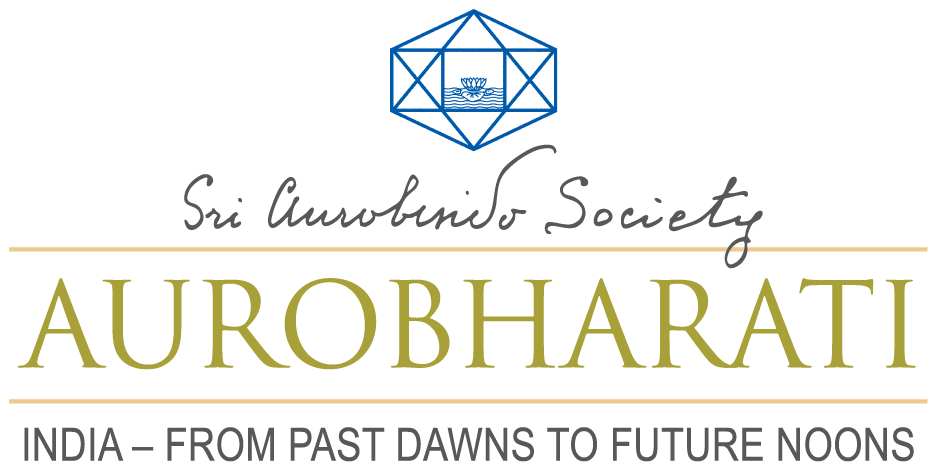National Symposium on ‘Valuing teachers' voices towards a new social contract for education: Views from India
Location: Department of Tourism
Institute: AuroBharati
A new spirit of oneness will take hold of the human race. -Sri Aurobindo
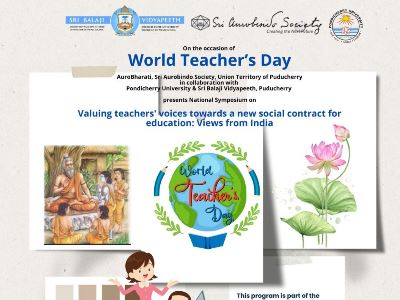 As a mark of celebrating the World Teacher’s Day, AuroBharati, Sri Aurobindo Society, Union Territory of Puducherry in collaboration with Pondicherry University and Sri Balaji Vidyapeeth, Puducherry organized a National Symposium on ‘Valuing teachers’ voices towards a new social contract for education: Views from India.’ This program was part of the initiative ‘International Cultural Relations’ by AuroBharati, Sri Aurobindo Society, Puducherry. Particular problems pertaining to the advancement and sustainability of education was the subject of the National Symposium.
As a mark of celebrating the World Teacher’s Day, AuroBharati, Sri Aurobindo Society, Union Territory of Puducherry in collaboration with Pondicherry University and Sri Balaji Vidyapeeth, Puducherry organized a National Symposium on ‘Valuing teachers’ voices towards a new social contract for education: Views from India.’ This program was part of the initiative ‘International Cultural Relations’ by AuroBharati, Sri Aurobindo Society, Puducherry. Particular problems pertaining to the advancement and sustainability of education was the subject of the National Symposium.
On this occasion, Dr. K. Tharanikkarasu (Vice-chancellor I/C), Pondicherry University and Prof. Nihar Ranjan Biswas, Vice Chancellor of Sri Balaji Vidyapeeth conveyed their wishes for the deliberation. Emphasizing on the Valuing Teachers’ Voices Towards a New Social Contract for Education, Prof. Nihar Ranjan Biswas, Vice Chancellor of Sri Balaji Vidyapeeth shared a beautiful message ‘this gathering comes at a pivotal moment in our educational landscape, where the insights and experiences of teachers are more crucial than ever in shaping a resilient and equitable future for education.’ He further said that ‘by valuing the insights of our educators, we can empower them to drive meaningful change in our classrooms and communities.’
Dr. Balanehru Subramanian, Principal of School of BioMedical Sciences, Sri Balaji Vidyapeeth, Pondicherry, India, Puducherry, Dr. Mathimaran Natarajan, Deputy Dean – International Relations, Associate Professor & Center Head, Center for Sustainability and Climate Studies, Department of Ecology & Environmental Sciences, Pondicherry University and Dr. Kishor Kumar Tripathy, Member Secretary, AuroBharati, Sri Aurobindo Society shared their innovative experiences on this subject.
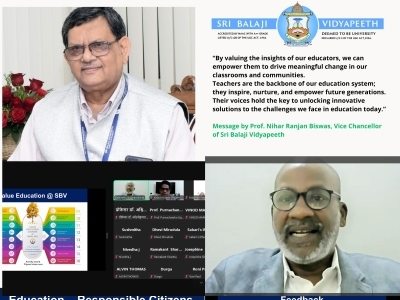 Highlighting the importance of the celebration, Dr. Kishor Kumar Tripathy, Member Secretary, AuroBharati, Sri Aurobindo Society said that World Teachers’ Day, is the day to honor teachers and acknowledge their important role in shaping history. This day serves as a chance to consider the difficulties that educators encounter and to push for enhancements to all educational establishments worldwide.
Highlighting the importance of the celebration, Dr. Kishor Kumar Tripathy, Member Secretary, AuroBharati, Sri Aurobindo Society said that World Teachers’ Day, is the day to honor teachers and acknowledge their important role in shaping history. This day serves as a chance to consider the difficulties that educators encounter and to push for enhancements to all educational establishments worldwide.
Emphasizing on the valuing educators’ voices in the direction of a new educational social contract with special emphasis on the views of India, Dr. Tripathy focused on integral education, which is founded on the teachings of Sri Aurobindo and the Mother akes a comprehensive approach to education that develops a person’s emotional, bodily, and spiritual well-being in addition to their intellectual faculties. He provided numerous instances of how self-discovery, experiential learning, and holistic development support students’ physical, mental, emotional, and spiritual growth. He stressed the importance of teachers in adopting the concepts of integral education, saying that they facilitate learning, foster a loving environment, and foster greater creativity and critical thinking.
Dr Tripathy further said that Integral education, as envisioned by Sri Aurobindo, is a transformative strategy that develops the full person, with instructors serving as essential mentors and nurturers for their charges. This approach empowers people to make meaningful contributions to society in addition to helping them achieve personal achievement. Dr. Tripathy highlighted the value of teachers, emphasizing their contributions in the areas of expertise recognition, community involvement, equity and inclusivity, and collaborative networks.
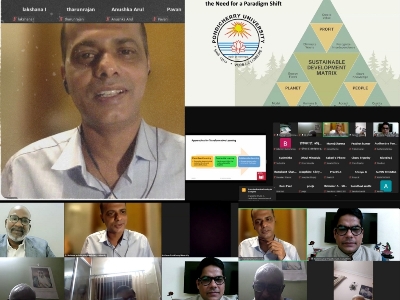 Dr. Mathimaran Natarajan (Deputy Dean – International Relations, Associate Professor & Centre Head, Centre for Sustainability and Climate Studies, Department of Ecology & Environmental Sciences, Pondicherry University spoke on ‘Sustainability in Education: Teachers as Catalysts for Transformative Learning.’ He said that in an era marked by climate crises and environmental degradation, education plays a pivotal role in shaping a sustainable future. He emphasized that Teachers are not only knowledge bearers but also agents of change who can inspire transformative thinking in students. This explored the role of educators in embedding sustainability principles into curricula, fostering critical thinking, and nurturing ecological consciousness among future generations. He suggested that by adopting a holistic approach, teachers can bridge the gap between environmental science and societal action, leading to an empowered, sustainable citizenry capable of addressing global environmental challenges.
Dr. Mathimaran Natarajan (Deputy Dean – International Relations, Associate Professor & Centre Head, Centre for Sustainability and Climate Studies, Department of Ecology & Environmental Sciences, Pondicherry University spoke on ‘Sustainability in Education: Teachers as Catalysts for Transformative Learning.’ He said that in an era marked by climate crises and environmental degradation, education plays a pivotal role in shaping a sustainable future. He emphasized that Teachers are not only knowledge bearers but also agents of change who can inspire transformative thinking in students. This explored the role of educators in embedding sustainability principles into curricula, fostering critical thinking, and nurturing ecological consciousness among future generations. He suggested that by adopting a holistic approach, teachers can bridge the gap between environmental science and societal action, leading to an empowered, sustainable citizenry capable of addressing global environmental challenges.
Dr. Balanehru Subramanian (Principal of School of BioMedical Sciences, Sri Balaji Vidyapeeth, Pondicherry emphasized on ‘Value Education: A Rationale Approach.’ He focused on the essential need of education and its evolutionary role in shaping the society and its culture based on the ethos of Indian tradition. He identified the key needs of the modern education practices derived from the Indian Knowledge Systems. He shared his experience in evolving and successfully implementing an array of Value Education Courses in greater benefit of the future generation of good citizens. He concentrated on educating people to become responsible citizens, with a particular emphasis on the fundamental beliefs and ideals that support the welfare of the individual, the cosmos, and society through holistic personal growth, high-caliber experience, and the formation of society and culture. He proposed that in order for modern education to flourish, students and teachers must have greater access to experiential learning opportunities, individualized mentorship, and trust.
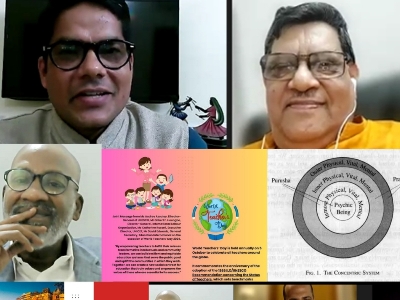
Participants representing various institutions also shared their views on this occasion. Prof. (Dr.) Ashwini Kumar Shukla mentioned that ‘The role of the teacher is clear and it is never going to be diminished. In fact, the job of a teacher is not only to teach, but also to inspire to do something new and for the welfare of all. That is why the role of teacher has been important since the beginning of human civilization and will always remain so.’ Dr Prabhat Shukla, Horticulture commissioner of India, Ministry of Agriculture ‘Optimisation of resources use is very important and equally important is optimisation of needs to have sustainable development in all sphere of life’ Developing an ecosystem to nurture innovation in academic institutions is very essential. He further opined that Indian tradition knowledge should be scouted which are very rich to teach us circular economy, resulting in economic sustainability.
Important projects and activities for the advancement of Indian Knowledge System will be implemented as part of the partnership between Sri Aurobindo Society, Pondicherry University, and Sri Balaji Vidyapeeth.
